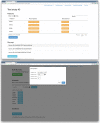New Tools for New Research in Psychiatry: A Scalable and Customizable Platform to Empower Data Driven Smartphone Research
- PMID: 27150677
- PMCID: PMC4873624
- DOI: 10.2196/mental.5165
New Tools for New Research in Psychiatry: A Scalable and Customizable Platform to Empower Data Driven Smartphone Research
Abstract
Background: A longstanding barrier to progress in psychiatry, both in clinical settings and research trials, has been the persistent difficulty of accurately and reliably quantifying disease phenotypes. Mobile phone technology combined with data science has the potential to offer medicine a wealth of additional information on disease phenotypes, but the large majority of existing smartphone apps are not intended for use as biomedical research platforms and, as such, do not generate research-quality data.
Objective: Our aim is not the creation of yet another app per se but rather the establishment of a platform to collect research-quality smartphone raw sensor and usage pattern data. Our ultimate goal is to develop statistical, mathematical, and computational methodology to enable us and others to extract biomedical and clinical insights from smartphone data.
Methods: We report on the development and early testing of Beiwe, a research platform featuring a study portal, smartphone app, database, and data modeling and analysis tools designed and developed specifically for transparent, customizable, and reproducible biomedical research use, in particular for the study of psychiatric and neurological disorders. We also outline a proposed study using the platform for patients with schizophrenia.
Results: We demonstrate the passive data capabilities of the Beiwe platform and early results of its analytical capabilities.
Conclusions: Smartphone sensors and phone usage patterns, when coupled with appropriate statistical learning tools, are able to capture various social and behavioral manifestations of illnesses, in naturalistic settings, as lived and experienced by patients. The ubiquity of smartphones makes this type of moment-by-moment quantification of disease phenotypes highly scalable and, when integrated within a transparent research platform, presents tremendous opportunities for research, discovery, and patient health.
Keywords: evaluation; informatics; mental health; schizophrenia; smartphone.
Conflict of interest statement
Conflicts of Interest: None declared.
Figures










References
-
- Dyson F. Imagined Worlds. Cambridge, MA: Harvard University Press; 1988.
-
- Insel. Thomas NIMH. 2015. [2015-09-19]. Director's Blog: BRAIN - Creating the Next Generation of Tools http://www.nimh.nih.gov/about/director/2014/brain-creating-the-next-gene... .
-
- Torous J, Chan SR, Yee-Marie TS, Behrens J, Mathew I, Conrad EJ, Hinton L, Yellowlees P, Keshavan M. Patient Smartphone Ownership and Interest in Mobile Apps to Monitor Symptoms of Mental Health Conditions: A Survey in Four Geographically Distinct Psychiatric Clinics. JMIR Ment Health. 2014;1(1):e5. doi: 10.2196/mental.4004. http://mental.jmir.org/2014/1/e5/ v1i1e5 - DOI - PMC - PubMed
-
- East ML, Havard BC. Mental Health Mobile Apps: From Infusion to Diffusion in the Mental Health Social System. JMIR Ment Health. 2015;2(1):e10. doi: 10.2196/mental.3954. http://mental.jmir.org/2015/1/e10/ v2i1e10 - DOI - PMC - PubMed
-
- Torous J, Staples P, Shanahan M, Lin C, Peck P, Keshavan M, Onnela J. Utilizing a Personal Smartphone Custom App to Assess the Patient Health Questionnaire-9 (PHQ-9) Depressive Symptoms in Patients With Major Depressive Disorder. JMIR Ment Health. 2015;2(1):e8. doi: 10.2196/mental.3889. http://mental.jmir.org/2015/1/e8/ v2i1e8 - DOI - PMC - PubMed
Grants and funding
LinkOut - more resources
Full Text Sources
Other Literature Sources
Medical

